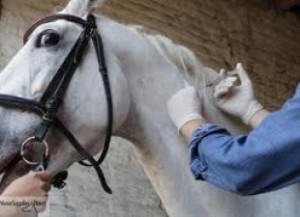The Western Cape Department of Agriculture has issued a press release dated 8 April 2016 confirming an investigation into a suspected case of African Horse Sickness.
Alan Winde, Minister of Economic Opportunities, said the suspected case had been detected by a private vet in Paarl, through clinical surveillance. “Samples collected from the colt tested positive for the AHS virus. We activated a routine surveillance programme immediately. Our vets are working in the area to determine whether any other animals on the property are affected.”
“The suspected case took place within the AHS surveillance zone. Movement restrictions are in place and no movement of horses is allowed into the containment zone without a movement permit from a state vet.”
“We urge horse owners to stable their horses from two hours before sunset to two hours before dawn to minimise the risk of the vector of the disease having contact with their horses. In addition, we appeal to owners to use a registered insect repellent during the vector feeding periods.”
The containment zone for this incident is as follows:
The eastern border of the zone follows the border of the AHS surveillance zone from Gordon’s Bay along the Limietberg mountain range to Gouda. The boundary of the containment zone then extends westwards along the R46 through Hermon, Riebeeck Kasteel and to Malmesbury;
The western border of the zone follows the N7 until it intersects with the N2;
The N2 serves as the southern border of the containment zone until it reaches the eastern border at Gordon’s Bay;
Roads that make up the borders of the zone are not included in the movement restrictions and transport of horses along these roads is permitted.
Please click the link to see the AHS Containment Zone 8 April 2016.
Minister Winde added that the Western Cape Government was taking measures to protect the province’s status as an African Horse Sickness free zone. These measures include that all horses entering the province’s AHS Controlled Area would spend 14 days at a stop-quarantine facility.
According to the AHS Control Policy: Movement Control Protocol, all horses entering the AHS Controlled Area, from an AHS Infected Zone, must have been vaccinated within the past two years and not less than 40 days prior to entry.
Any owner within the AHS surveillance zone detecting illness in horses, which includes unexplained fever, swelling of the head and neck and difficulty breathing should report the case to the local state vet.
Visit www.elsenburg.com for the contact details of the relevant state vet.
Permit applications can be lodged with Dr Camilla Weyer at [email protected]









